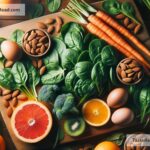Foods That Reduce the Risk of Nasal Polyps
Nasal polyps are small, non-cancerous growths that develop in the lining of the nasal passages or sinuses. Though they are not life-threatening, they can be uncomfortable and cause problems like a blocked nose, difficulty breathing, or recurring sinus infections. Many people don’t realize that what they eat plays an important role in preventing or managing nasal polyps. The good news is, there are certain foods that can help reduce inflammation and keep your nasal passages clear, potentially lowering your risk of developing these annoying growths.
Let’s take a look at how diet impacts nasal polyps and which foods can help.
The Link Between Diet and Nasal Polyps
Nasal polyps are often linked to chronic inflammation, allergies, or conditions like asthma and sinusitis. When your body is in a state of constant inflammation, it may increase the likelihood of polyps forming. Diet plays a major role in controlling inflammation, as certain foods can either aggravate or reduce it.
In many cases, people with nasal polyps also have sensitivities to foods that trigger allergic reactions or worsen inflammation. For example, sugary, fatty, and processed foods can worsen sinus issues and make polyps more bothersome. On the other hand, fresh and wholesome foods packed with nutrients can improve nasal health, reduce inflammation, and strengthen your immune system.
Top Foods That May Help Reduce the Risk of Nasal Polyps
Here are some foods that are especially helpful when it comes to keeping your nasal passages healthy and inflammation under control:
1. Fruits Rich in Vitamin C
Vitamin C is a powerful antioxidant that supports your immune system and fights inflammation. It can also help maintain healthy sinus tissues, reducing the likelihood of irritation that leads to polyps. Try incorporating these Vitamin C-rich fruits into your diet:
- Oranges
- Lemons
- Grapefruits
- Kiwi
- Strawberries
These fruits also contain water, which helps to hydrate your nasal passages and prevent dryness.
2. Leafy Green Vegetables
Leafy greens like spinach, kale, and Swiss chard are rich in antioxidants, vitamins, and minerals. They are excellent for reducing inflammation throughout the body, including the nasal passages. Leafy greens also contain magnesium, which is known to support proper breathing and reduce nasal congestion.
Add leafy greens to your salads, smoothies, or stir-fries to reap their benefits.
3. Garlic and Onions
Garlic and onions have natural anti-inflammatory and antimicrobial properties. They not only help reduce swelling in the nasal tissues but may also fight off bacterial infections in the sinuses that worsen polyps. Additionally, garlic contains allicin, a compound that promotes healthy airflow and relieves stuffy noses.
Include garlic and onions in soups, stews, or pasta dishes for a tasty way to protect your nasal health.
4. Omega-3 Fatty Acids
Foods rich in omega-3 fatty acids are well-known for their ability to fight inflammation. Omega-3s help balance the immune system and reduce swelling in the nasal passages. You can find omega-3s in these healthy foods:
- Salmon
- Mackerel
- Sardines
- Walnuts
- Chia seeds
- Flaxseeds
Making omega-3-rich foods a regular part of your diet can help manage chronic inflammation and lower your risk of nasal polyps.
5. Turmeric
Turmeric is a golden spice with a long history of use in traditional medicine. Its active ingredient, curcumin, is a powerful anti-inflammatory agent that can help soothe irritated nasal tissues. Turmeric is also known for improving overall respiratory health.
You can add turmeric to curries, teas, or smoothies, or take it as a supplement after consulting your doctor.
6. Probiotic Foods
Probiotics are good bacteria that support gut health, and a healthy gut often translates to less inflammation in the rest of your body. Probiotic foods can help regulate your immune system, which is crucial for preventing nasal polyps. Some great sources of probiotics include:
- Yogurt
- Kefir
- Sauerkraut
- Kimchi
- Miso
Incorporating probiotics into your daily diet can offer long-term benefits for your nasal and overall health.
7. Ginger
Ginger is another natural anti-inflammatory food that can contribute to better sinus health. It contains compounds like gingerol that help alleviate sinus pressure and reduce swelling in the nasal passages.
Try brewing fresh ginger tea or adding grated ginger to your meals for a soothing sinus remedy.
8. Hydrating Foods
Staying hydrated is essential for keeping mucus thin and preventing nasal passages from drying out. Foods with high water content, like cucumbers, watermelon, and celery, can help maintain optimal hydration levels. Drinking plenty of water throughout the day is equally important.
Foods to Avoid
While the above foods can help reduce the risk of nasal polyps, some foods may have the opposite effect by promoting inflammation. Limit or avoid:
- Sugary foods (candies, sodas)
- Processed snacks (chips, frozen meals)
- Saturated fats (fried foods, fatty meats)
- Dairy (if you’re sensitive to it)
Paying attention to what you eat can make a big difference in managing nasal polyps.
Final Thoughts
While nasal polyps can be frustrating, incorporating anti-inflammatory and nutrient-rich foods into your diet may help reduce your risk and improve your nasal health. Fruits, vegetables, spices like turmeric and ginger, and omega-3 fatty acid-rich foods are your best allies in fighting inflammation and keeping your sinuses clear. Along with eating a balanced diet, staying hydrated, managing allergies, and avoiding foods that worsen inflammation can lead to noticeable improvements.
Remember, a healthy diet is just one part of reducing nasal polyps. Always consult a healthcare professional for personalized advice and treatment options tailored to your needs.


